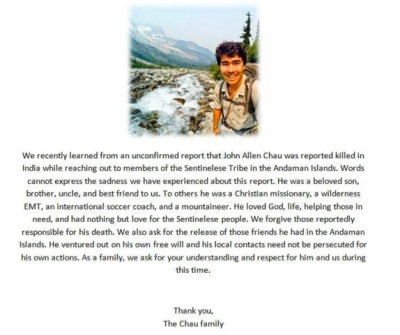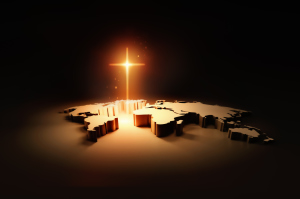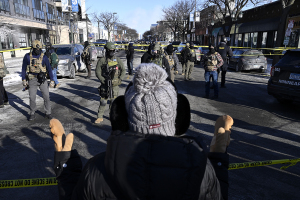A friend's reflection on John Chau’s journey to North Sentinel Island

It has been almost 6 weeks since reports of John Chau’s death at the hands of a remote island tribe in the Indian Ocean made international news. With Christmas here, perhaps it is time to revisit John's story in light of the Christmas story.
The lesser known version of the Christmas story can be found in the first chapter of the gospel of John, wherein it says “he came to those who were his own, yet His own did not recognize him.”
On November 15th and 16th of this year, a 26-year-old man named John Chau went to those whom he saw as his own and he too was rejected. This led to an international discussion about Mr. Chau’s decisions, his preparedness and his purpose in going to North Sentinel Island. Initial articles depicted him as a foolish American millennial who was little more than an adrenaline junkie with a penchant for making foolish decisions. He has been presented in various forms of media as a highly unprepared, culturally uneducated and naive young man who may have "gotten what he deserved" for daring to penetrate an Island utopia isolated for many thousands of years. However, in the ensuing weeks new information has emerged which profoundly challenges those initial portrayals. It is still reasonable and worthwhile to ask who John was and what was his purpose in going to North Sentinel Island. Was John merely a rogue “adventurer” harboring an unspoken death wish who foolishly went to a remote Island in the Indian Ocean to kick a soccer ball around with the most isolated tribe on the planet or is it possible he was someone much more?
The primary weakness of the articles written in the first days after Chau’s tragic passing is that they significantly misrepresented his intentions and his purpose. This fact is perfectly reasonable given the scarcity of material facts initially known about the situation. Writing about John Chau in the early days after his death was certainly difficult and even today is no easy task. Trying to understand who John was from his Instagram page and a few scattered and sometimes conflicting facts is challenging. It is for this reason I hope to clear up a few of those misunderstandings and to address John’s motives in going to North Sentinel Island. Let me mention here that I did know John, though not very well. I had the chance to meet him overseas several years ago when he was visiting our community with a team of short-term missionaries. Since that time, I have both kept up with his journey and corresponded with him sporadically. I also received his monthly update letters in the years since meeting him.
Anyone who knew or met John would describe him as a warm and engaging young man who had a deep love for God that came out in his love for others. He was also a gentle person defined by his clarity of thought and focus. That’s not to suggest that John wasn’t adventurous, because by any regular standard, he clearly was. He had climbed mountains, scuba dived, traversed jungles and visited multiple far-flung corners of the earth in his quest to be prepared for the calling he was convinced he had received from God. But to reduce John’s identity to merely an “adventurer” would be like describing a policeman who is a cycling enthusiast that rides on weekends and holidays as a “cyclist.” Imagine if that same officer, while cycling through his city one Saturday turned down a street in which rival gangs were fighting and instinctively screamed “STOP!” but was immediately shot dead. News reports that came out following this incident might read “Cycling Enthusiast Attempts to Stop Gang Violence and is Shot Dead.” We may even see people speculating about the foolish nature of a cyclist trying to stop a gang fight while wearing spandex. Some would cruelly laugh and mock such a “foolish” person and twitter would come alive with fresh memes mocking the spandex moron who tried to stop gangs from doing what they do. The analogy isn’t perfect by a long shot and I do recognize that police officers have very precise protocols they would follow to the tee, regardless of the context. Yet his analogy rightly depicts how those of us who knew John feel about the way he has been described. His life and reputation have been mischaracterized and then thrust into the public eye to be scrutinized by the world when so little of the actual facts were known. When the full truth is known, however, it paints quite a different picture than the one presented in the days immediately following John’s death.
Agree with him or not, John did not make a rash decision to head to North Sentinel Island on November 15th. As it turns out, John determined back in high school almost 10 years ago that he wanted to bring the gospel to those who had never heard. Countless young Christians, in their youthful exuberance, go through a “stage” of their faith wherein they too desire to reach the unreached with the gospel. Most of these move on to other goals which draw their attention away, but John wasn’t like most people. He held on to his love for the North Sentinelese through college and began taking every opportunity to prepare himself for such a radical calling and purpose for his life even these past few years after college.
So what is the truth about John Chau? Some have accused him of being a social media millennial who had an addiction to adventure with a bit of religion added on for good measure. Others have suggested he was little more than a glory hound seeking international fame by visiting an anthropological treasure trove like North Sentinel Island. The most generous of his detractors have accused him of having a great lack of wisdom and being naive to the point of foolishness.
However, a fuller look at the evidence suggests these are misrepresentations and grossly misleading. John was a rigorously focused young man who had passionately and deliberately pursued The Andaman Island peoples for the past nine years, with a particular heart for the inhabitants of North Sentinel Island. He prayed for the Island for years and prepared in a myriad of ways to move there. It was his deep desire that they would know and experience the love of God that he himself had experienced. He first developed a heart for that portion of the world while in high school when he was 17 and had remained steadfast through most of his major life decisions over the past decade. It is fundamental to understanding John Chau’s intentions that one know he planned to live there. His desire was to become one of them, hunting alongside the North Sentinelese, sleeping in their huts, eating the same diet and learning their language. His intention was never to simply drop in and preach to them in English as some have erroneously suggested. In fact, one learns from his updates, his journal entries, and from conversations with his friends that John was fully committed to living there for the rest of his life, something that tragically came to pass far earlier than he hoped. Though he very clearly knew the risk and regularly mentioned it in his updates and in his now published journal entries.
Let’s briefly consider how he prepared himself for the rigors of life among a stone age tribe like the North Sentinelese. He chose to study Health, Exercise Science, and Sports Medicine as an undergraduate. He subsequently received wilderness survival EMT certification after graduating from university and became a wilderness emergency medical technician to be prepared for the many emergencies that are an inevitable part of the life he was choosing. At one point he survived a rattlesnake bite. It turns out, John did almost everything a person could do in order to prepare for the life he was choosing by moving to North Sentinel Island.
What about the common observation that John didn’t know the language? This is easily the least credible of all the criticisms leveled against John. Why? Because no one on the planet, aside from the North Sentinelese themselves, know their language. Historical attempts to have other islanders come close and listen have been fruitless and, as far as anthropologists know, they appear to have been isolated far too long for their language to have any contemporary cousins. This means that the only way a person could ever speak their language is to live among them and learn it. To this end, John took a highly specialized course in linguistics and cultural anthropology which emphasizes how to learn a language from scratch. This particular course trains one in how to preserve a language that has never been written down. To further strengthen his linguistic skills, John’s private reading list in 2017 and 2018 included seven different books on linguistics, phonology and language acquisition. He also read 9 different books on the Andaman Islands, most of which were about North Sentinel Island in particular. In addition to those books, he read a variety of others written by those who had successfully reached stone age tribes with the gospel at various points in history. All told, John read 113 books in the 21 months before landing on the shore of North Sentinel Island. The average American reportedly reads 12 books in a year, John read 65 books in the first 9 months of 2018 alone.
The most credible of concerns brought to light about John’s trip to North Sentinel Island is the fact that his presence there could mean bringing diseases against which the Sentinelese do not have any resistance. John appeared aware of the danger his presence could bring in terms of pathogens. His concerns about this resulted in him being vaccinated against thirteen and quarantining himself for 11 days just prior to heading to the island. While this would not entirely remove the risk of contagion, it shows another area where John was deliberate and thoughtful about his plans to serve the tribe among which he hoped to make his dwelling. While this is easily the most controversial of John’s decisions, even on this point there are a variety of opinions about whether or not a tribe like the Sentinelese will ultimately be better off in isolation.
Considering that modern science has lengthened lives, helped prevent diseases and generally correlated with much longer and healthier lives, it is not a foregone conclusion that the Sentinelese should be left alone in perpetuity. Dr. Kim Hill an anthropologist at Arizona State was quoted in the New York Times as saying that it is “unwise and inhumane to forcibly keep these groups isolated by building protective fences around them.” He goes on to explain that a small isolated tribe faces risk of extinction due to becoming too small. It isn’t difficult to imagine the potential problems associated with a gene pool becoming too small. “Humans are an extremely social species,” he adds. “No groups want to live isolated forever. They do it out of fear.”
This isn’t meant to imply an endorsement by Dr. Hill of John’s particular approach, but it reveals that the issue isn’t as simplistic or non-controversial as many have suggested. There are certainly varied ways of understanding how the modern world should intersect with a stone-age tribe, if at all. Whether or not we should introduce an ancient tribe to the benefits of modern medicine, longer lives, an expanded gene pool and a host of other benefits such exposure could bring or whether we should allow them to remain isolated and risk extinction as an eventual result of this isolation is by no means an easy question.
This leads to an already mentioned yet controversial point: John certainly and unashamedly did want the North Sentinelese to know the love of God he had experienced through Jesus Christ. This is not difficult to discern from his journal entries and update letters. However, and this is critical to the discussion, he didn’t want to “convert” them as has so often been said. In fact, this isn’t a phrase most Evangelicals would use and it isn’t how most Christians would think about the concept. Typically it is only those on the outside of Christianity looking in who would understand evangelism in this way.
Why? Because traditionally Christians believe only God can convert a person from unbelief to belief. However, he assuredly did want them to have a chance to experience the love and forgiveness he believed was available to all who follow Jesus. Regardless, it is important to understand that he didn’t see them as lesser or more in need of God’s love than he himself was. Rather, he would have viewed them as complete “equals” whom he didn’t want to miss out on the chance to know God personally. This is richly evident in his planned method of becoming one of the North Sentinelese. He didn’t come to make them one of him, but to become one of them in order to ultimately reveal God’s love for them.
Finally, John wasn’t a colonialist. His desire was not to subjugate or exploit the Sentinelese in any way whatsoever. Colonialism is based upon an assumption of cultural superiority whereas mission is based upon the assumption of the great value of every human person to God and the equality of all human persons in God’s eyes. I should probably specify that when I say “mission” I am speaking of true Christocentric mission. A value that is so great in Christian thought that God Himself became flesh in order to save individual humans. John was a missionary in the sense that Jesus was a missionary. He was not a colonialist. Lay aside his multivariate and rich personal ethnic history and consider again that his intention was to live among arguably the most primitive tribe on the planet, go through the process of learning their language over months and years, eat what they eat, survive how they survive and ultimately become one of them in order to share the love of a God who became one of us in order to win us back from how we had gone astray.
John didn’t land on North Sentinel island for a photo op, an adventure, or for a short-term mission trip. There is not one way in which it could be said John was unprepared in virtually any sense of the word. John followed Jesus, who also came to “those who were his own” and was also rejected by the ones He came to love. The story of Christmas is of God becoming flesh while knowing full well that He would be rejected and ultimately killed. John was not Jesus, but he went in the attitude of Jesus to become one of those who didn’t know him, knowing that he may pay the ultimate price for his audacity. His intentions were to ultimately show the Sentinelese the love of Jesus. Like Jesus, he was rejected. May God bring love and life and hope to the North Sentinelese.



























